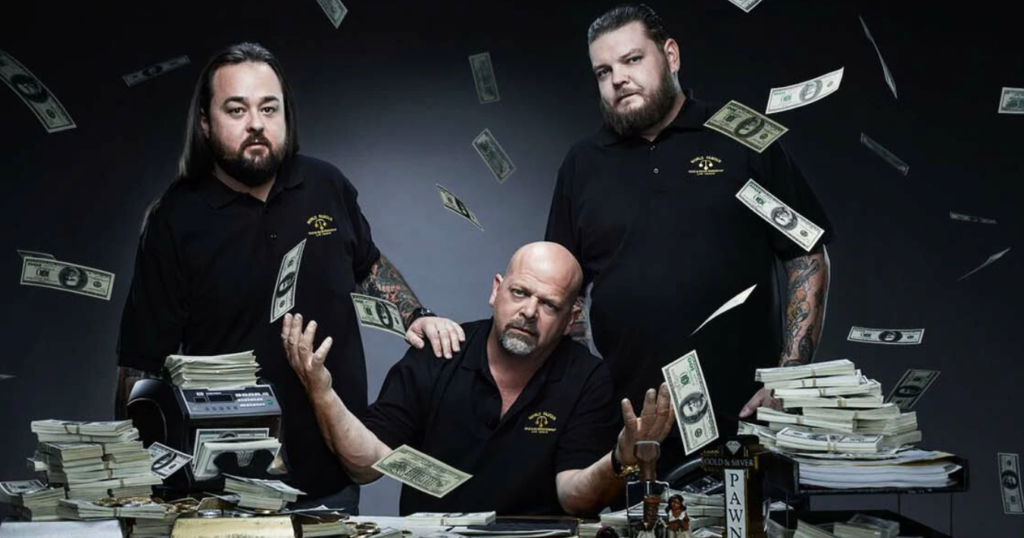This was originally going to be a Digital Asset-themed post with a huge nod at finding value in video games, but as I researched accessibility and potential risk hedging (originally for some freelance work), pricing, particularly C2C (customer to customer) became quite a thing. The very human process by which a ready buyer and seller come to an agreement on a price doesn’t change, and watching History Channel’s Pawn Stars, now in their 18th season, seemed a good low-tech way to illustrate that, before we bring in technology and financial derivatives instruments.
“The best part of my business is working with my family. The worst part of my business is working with my family.” -Rick Harrison

Pawn Stars revolves around the buy-sell adventures of the Gold and Silver Pawn Shop in Las Vegas, started by Grandfather Harrison who uprooted his family after running up a USD 1million housing investments debt.
Four guys, no girls, no skin – except what’s in the game 
They pay cash upfront for weird, wacky and wonderful collectors’ items, thereby scoring finds for 20-50% discounts off retail prices. You may think that’s a scalp, but it’s all above board – a valuations expert in the field often comes in to provide a retail price in front of the seller, and then the Harrisons agree on a discount with said seller, as compensation for bearing the risk the item will not sell, auction fees and hassles if they go that route to sell it etc, while the seller walks out with cash. Or, the seller walks out with their item, if no deal is struck. Plain and simple, I absolutely love this. NO subterfuge. Biggest irony ever, it happens in a pawn shop in Sin City. All the well-dressed self righteous hypocrites in the nice office buildings (Imma embedding Big Short clips, next!) take note, please.
Another thing I really like is how this pawn shop handles antique firearms sales – they ask the respective experts to date the items to ensure what they buy is compliant with firearm regulations (for eg in the cannon clip further down Rick turns down a purchase he otherwise really wanted, because the expert cannot guarantee the item and potentially replaced parts were all made before the 1900s.)
Anyway, both Rick (dad) and Corey (son) started in the family business back in primary school. Then around the age of 18, if you watch enough of their haggling footage, it would seem Corey is the toughest negotiator – of the 4, he appears to give the worst starting price to the seller. But then there’s an episode where he describes how when he was starting out someone sold them (through him) a fake Rolex… and very quickly word must have got out that he was an easy touch because throughout that week several more sellers then came in and sold him a few more. So you do see little indications early on in their series where he’s quite conscious about whether the dad will trust him with big deals. (No, it’s not the time he tests out a vintage collectors’ item toy and ends up shooting his dad with it. Big black eye.)
The dynamic with son’s friend Chum is also interesting, he’s been there over a decade, he snarks at the boss (the dad), they rib him hard… but he gets the biggest gift of all of them, each Christmas. AND he now runs the candy store across the street from this pawn shop as well – you can find him on Instagram here.
It being Vegas (tourists), the shop must’ve had many more interesting items because they certainly have a lot of people selling weird, old, rare or historically significant items. This one’s a Samurai sword:
And then you see how human nature really hasn’t changed and technological advancement just alters their methods (but not their motives). One example is when you watch the appraisal of rare and ancient coins. At one point Rick tells how in olden times people would nick a bit of the precious metal off the edge of the coin, eventually having enough little bits to make a whole new coin:
There’s a version of this done with technology that’s been around since before even I went to college, called “Salami Slicing”.
Someone got the bright idea of writing a program on top of their employer’s existing accounting program, which would round UP all the costs… and deposit the few cents’ difference from the rounding into their own account, figuring customers wouldn’t bother to go searching for the few extra cents. There’s of course all kinds of variants, but I think the consistent bit is where the cyber attacker skims off an otherwise negligible amount from each account. Hence “Salami” like the thin slice of sausage/pepperoni/other processed meat on the pizza that you skim off the main piece).
From Pawn Stars in authenticating items, “If people find a way to fake it, they’re gonna do it. Always have, always will.” So they call in the experts. The original Salami people eventually got caught and went to jail (which is how they were a first case study in my IT Security 101 college course) but not before racking up enough salami to otherwise have retired on a beach sipping drinks with little umbrellas in them. Researchgate has a paper on mitigations.
To price the items and determine a good starting point to haggle at, the Harrisons have numerous experts come in (far below is a Youtube on the experts, the majority of whom selected by the History Channel) and they are as diverse as all the guest stars on Friends. You will be like, There’s People In The World Who Are Experts In This? You’d learn a lot more about people from the things they sell (and buy) – the Harrisons offer better for American sports memorabilia, get stumped by products they don’t understand (even for highty valued items)… there was a dad who played Pokemon with his two sons – he says then the boys grew out of the card game, but he never did:
And then this one’s a Teenage Mutant Ninja Turtles comic. Ever met the co-creator of Ninja Turtles? In this clip he confirms it started as a joke, “If Bruce Lee was an animal, what would be the stupidest animal?” and he even starts signing his own name with a Turtle after that. (uh.. Lee grew up in Hong Kong and ninjas are Japanese 

It’s valuable, but note the seller was hoping for USD 60,000, after observing a similar one that wasn’t signed went for USD 50,000 at auction. Instead, the expert places a retail value of USD 11,000 on it. And so I picked this item not just because of the Ninja Turtles but because of the massive difference in price on exotic and illiquid items. (Another way of looking at it however, is someone took the risk of paying for auction and made a killing on their copy :).
Liquidity, the chance at having other options, carries a premium. Whether that premium is a fair price in itself is yet another choice to be made. There are quite a number of sellers of otherwise valuable items on the show who choose not to sell, preferring to hold on to the item and wait for it to appreciate. If they hadn’t been liquid enough to sit, they’d risk having to make that unfavourable trade.
Which brings me to this shocker (and further note of caution about gambling beyond your means) of a trade where a guy walks in with a coin he says he accepted as a gambling debt. He asks for USD 20,000 for it (which implies he probably took the coin in lieu of payment of a gambling debt that was in the vicinity of USD 10-15k). The expert values the coin conservatively between USD 50,000 – 100,000, with a last done auctioned price on a similar coin in slightly better condition having exchanged hands at USD 100,000.
The seller of this one, who was originally hoping for USD 20,000, walks out with USD 80,000 in cash. Which is to say that the guy who traded it in exchange for gambling debt lost big – he either had no idea what it was worth (implying he had walked into the casino not expecting to gamble it away), was high on something or else was desperate. That’s a “bad” mistake.
Here are some “good” mistakes, when a “bad” note or coin is made – certain flaws and imperfections greatly increase the value of the piece:
The Pawn Shop explains often, that they bear the risk of not moving an item and having it sit in the shop indefinitely (though they do also bring things to auction to sell, and they move most of the good stuff pretty fast – I couldn’t even find the vast majority of the first edition books featured on the show.)
To thine own self be true. Know what you don’t know, and call in an expert 
Epilogue: The way I feel about pricings is that they govern everything. Everything in life has a price. Whether it’s HKD 1, a cup of coffee, an opportunity cost for a relationship or “priceless”, it’s still a price. In the same way to remain undecided is to choose indecision. (No escape, we are accountable for every. Single. Thing. We just never noticed :D) And if indecision is also a decision, then if you don’t agree on a price, Just. Say No. Wait for a better price. Which is what a fair number of sellers do. And buyers too. We should strive for that choice, not find ourselves desperate enough to have to make a bad one. As musician, author and philanthropist Peter Buffet, son of Warren Buffet says, true privilege is getting to choose. Whether that’s the path of least resistance OR the one of bountiful potentiality, they ALL bear a cost. Accept the cost, and dis truth shall set you free. To play video games. 



I have been exploring for a little for any high quality articles or blog posts on this kind of area . Exploring in Yahoo I at last stumbled upon this web site. Reading this info So i am happy to convey that I’ve a very good uncanny feeling I discovered exactly what I needed. I most certainly will make certain to do not forget this website and give it a glance on a constant basis.
I do not even know how I stopped up here, but I believed this put up used to be great. I do not realize who you’re however definitely you’re going to a famous blogger for those who aren’t already Cheers!
Cheers!
very good publish, i actually love this website, keep on it
Thanks for giving your ideas with this blog. Furthermore, a misconception regarding the banking institutions intentions if talking about home foreclosure is that the bank will not getreceive my installments. There is a degree of time in which the bank is going to take payments in some places. If you are way too deep inside hole, they will commonly demand that you pay the payment entirely. However, that doesn’t mean that they will not take any sort of installments at all. When you and the loan company can be capable to work something out, the actual foreclosure practice may stop. However, in the event you continue to skip payments underneath the new program, the property foreclosure process can just pick up exactly where it left off.